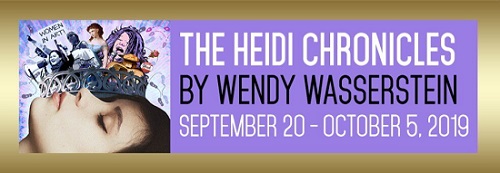 The Heidi Chronicles follows the personal and the political through the 60s, 70s, and 80s
The Heidi Chronicles follows the personal and the political through the 60s, 70s, and 80s
Alumnae Theatre kicks off its 102nd season with Wendy Wasserstein’s The Heidi Chronicles. Written in 1988, the play won the 1989 Pullitzer Prize for Drama, and the 1989 original production won the Tony Award.
The Heidi Chronicles follows Heidi Holland from a high school dance in the 1960s through the 70s and 80s. As Heidi’s life plays out, it becomes intertwined with historical and political events, from Eugene McCarthy’s presidential campaign to John Lennon’s assassination to the fall of the Berlin Wall.
This is a play of broad strokes. Heidi and her friends are the medium that convey the topical ideas and ideals of their time. Iconic historical images are projected onto the back wall of the stage. This creates well-rounded ties between the interpersonal relationship drama of the characters and the larger historical context.
Heidi is an Art History major, and later an Art History professor, as well as an advocate for representation of female artists. As a result, the play addresses the changing conversations and attitudes around women’s rights through the decades.
Heidi is a product of the expectations, trials, and dissatisfaction of womanhood. She becomes involved with a man named Scoop who treats her poorly and does not take her seriously. This is exasperatingly clear when, throughout her entire relationship with Scoop, he insists on calling her ‘Heidela’ (a diminutive pet name), even though Heidi repeatedly asks him not to.
She further experiences unwanted attention from other men and is constantly talked over and interrupted by male voices. Heidi seems permanently uncomfortable in her surroundings. At various political events and social gatherings, Heidi awkwardly explains, “I’m just here for a friend.” Heidi’s body language frequently conveys her discomfort and dissatisfaction. She clutches her coat in front of her body, clasps her arms around herself, or puckers her lips in discontent.
Heidi is dragged along through life, constantly trying to meet societal expectations: to marry and have children, to maintain the perfect body type, to be constantly producing work, etc. Heidi attends the weddings and baby showers of many of her female friends as she herself slowly falls into a depression.
As a woman, there are times when the play is frustrating to watch, and it feels that not much has changed in the minutia of daily life. It is only too realistic to watch Heidi try and fail to give a news interview while the two male leads interrupt her at every turn.
At the same time, the overall conversation about sexual equality has evolved since this play was written. Current conversations around gender and feminism have become so complex that the ideas put forth in this production feel oversimplified. The concept of “separating sexual needs from emotional dependencies,” as Scoop puts it, is the only mention of sexual liberation. Surprising, since the play is set during the sexual revolution.
The Heidi Chronicles is very much of its time in this way. While it’s interesting to see a play that is so much a part of its own era, I feel that this production is a little stilted in its portrayal of that time period. My guest commented that while it was interesting to look back at an 80s perspective, the production doesn’t have the same impact that it used to.
My guest and I both felt we lost some lines when actors spoke with their faces turned away from the audience. For me, the highlight of the production was the mini Art History lectures at the beginning of each act. The soundtrack was in keeping with the decade, which was a nice touch. I felt that the music brought some needed energy to the production.
The cast is predominantly female, which is an enjoyable change of pace in a theatre experience. But personally, I would have liked to see more energy, humour, and engagement with such an award-winning script. Nevertheless, I enjoyed watching a female-centric production, produced by a theatre founded and run by women.
Details
-
- The Heidi Chronicles is playing until October 5, 2019 at Alumnae Theatre (70 Berkeley Street)
- Shows run Wednesday to Saturday at 8pm, with an additional matinee on Sundays at 2pm
- Tickets are $25, with PWYC on Sundays
- Tickets are available online, by phone at 416-364-4170, ext. 1, or in person at the box office
- Tickets are general seating
Poster provided by the company

I enjoyed it and like you say in your review, I also found the lines hard to understand when spoken in a high voice – I think that it is a result of presenting the play against CONCRETE WALLS – and not the fault of the speakers.